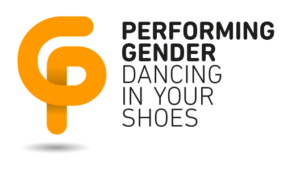Using dance to open up the body for discussion around gender
On the 2nd of April 2023, the Pomegranate Club Research Group closed its second season in Budapest’s SÍN Arts Centre with an open day. This season, colleague Ágnes Grélinger (Ági) and I continued the work Luca Borsos had done so consistently in 2021 and 2022. We stayed true to the group’s main principles: we have been facilitating and partaking in informal sessions that were centred around a broad understanding of gender, feminism, politics, and self-knowledge, allowing space for personal and interpersonal research, and different forms of knowledge to coexist; however this time, we introduced a less regular schedule, while making attempts to lay the grounds of a self-sustaining community that will hopefully expand from the scope of SÍN’s building or the program of Performing Gender.
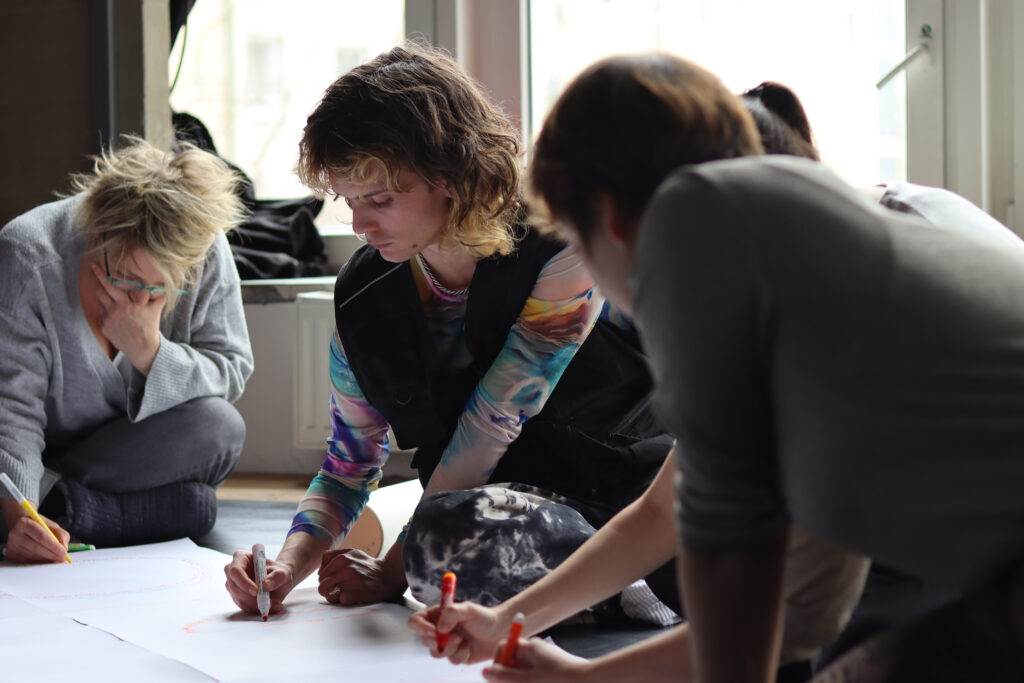
Ph: Danyi Viktoria
The season consisted of a 4-day creative workshop with Performing Gender traveling artist TC Howard, an individual research period, a weekend sharing session, a 2-day workshop on verbal and non-verbal communication with Ági, on gender identity and the transgender community with drama instructor Barbara Lévai and me, and a closing weekend with an open day.
The context
Pomegranate Club operates within a truly unique societal, institutional and artistic context, which needs to be disentangled in order to further understand the potentialities the program encompasses. In recent years, discourse on queerness and feminism has been stirred up as well as suppressed by the misogynist communication strategy of Hungary’s current political regime as well as by a number of new laws, making certain forms of LGBTQIA+ representation, or gender-confirming legal procedures impossible for Hungarian citizens.
Hence, the public opinion on gender equality, gender identity or same-sex relationships highly differs from that of most countries of the European Union. Although under such a political climate, no prior knowledge should be taken for granted, thanks to their overall awareness, literacy, kindness and open-minded attitude, participants were always prepared for detailed, comprehensive research and in-depth conversation.
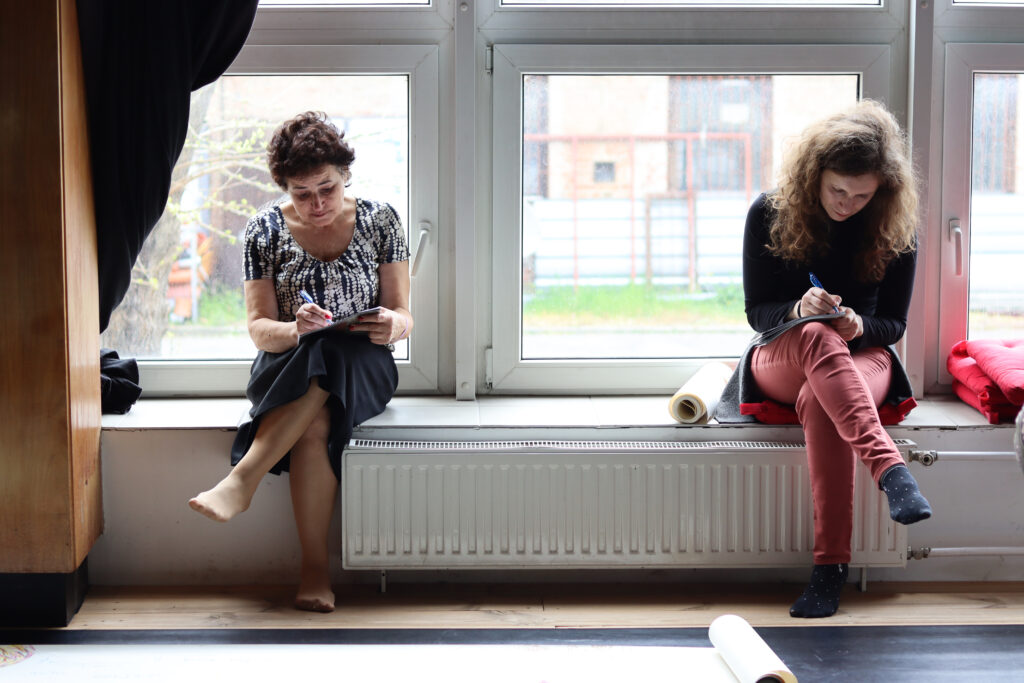
Ph: Danyi Viktoria
Most of our sessions took long journeys between personal and social, and our participants never failed to surprise us with their dedication and trust which allowed them to dive deep into the concepts, conflicts and experiences that were proposed. Many of our participants
came to our sessions with clear goals and processes they wanted to work on and potentially share with fellow members. On one hand, the sensitivity and diversity these personal trajectories give to the group are some of the most precious elements of the sessions. On the other hand, they create a vulnerable space which needs to be taken care of, preferably
collectively. During organising, taking care of and holding these spaces it has become extremely important to us to be clear about the fact that we are neither pedagogues nor therapists: we are artists invited to facilitate this program with the kind of knowledge we have. Keeping this in mind allowed us to draw healthy boundaries and helped participants remain responsible for their own experiences.
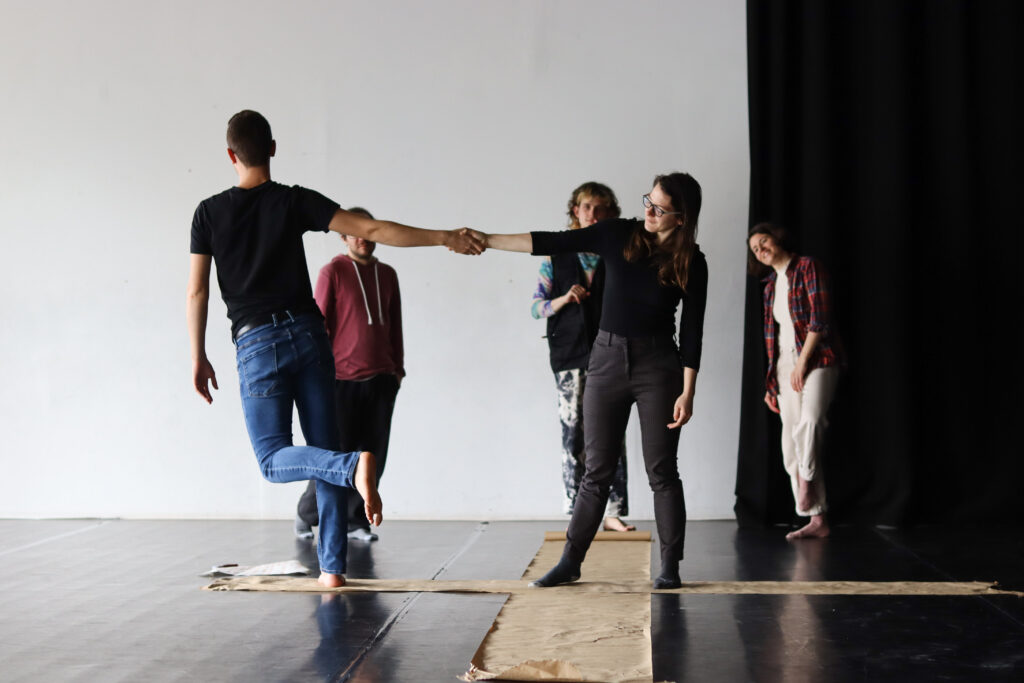
Ph: Danyi Viktoria
The form
Performing Gender encourages us to discuss gender through dancing and other physical practices. This idea obviously awakened my interest in an early moment: dancing and discussing gender are two activities I very much enjoy. But how can physical work activelycontribute to a discussion so complex and so broad, and how can theoretic knowledge enrich somatic experiences? These are extremely difficult questions and it probably doesn’t come off as a surprise that I don’t have a full answer to them. However, what I managed to understand throughout the sessions is that this framework actually offers a variety of connections between theory and practice one can choose from.
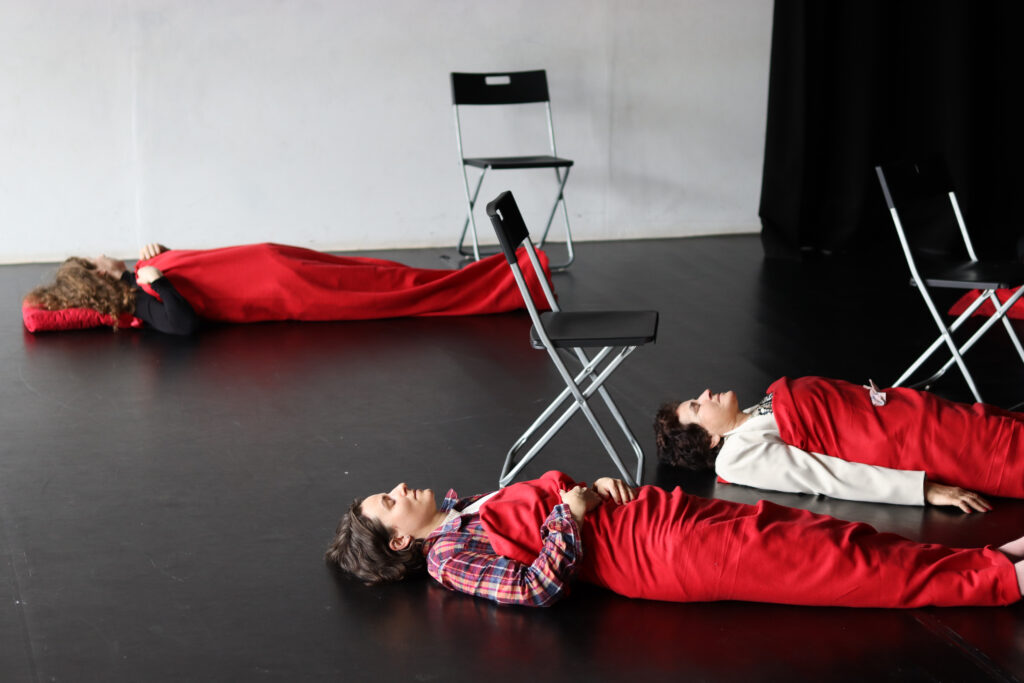
Ph: Danyi Viktoria
Of course, dancing about something is always exciting and fun and it can also be very insightful, but how about other forms of connections? How about the for, the with, the through, instead of the about? How about moving with our thoughts on equality? How about making a dance for our childhood self? How about thinking through movement? And also, how about using physical practices to open up the body for verbal discussion or to provide after-care?
The content
After assessing last year’s material, it was clear to us that Luca did an excellent job constructing and following a year plan that gradually guides participants into deeper complexities around gender. This consistency allowed us to create our year plan more freely, balancing between speculations on what the group might need, what our societal context might need from a group like ours, and what can be discussed further. We also had the chance to ask ourselves the question: what can we personally offer to the group?
As a gender non-conforming person, having been given such a platform under the current political climate feels like a huge opportunity and responsibility as well, therefore setting time aside to discuss gender identity, and learn about transgender identities and the trans community became crucial to me. I knew that this would lead to a fairly irregular workshop as some people might find this topic less personal or tactile than for example discussing those heteronormative gender norms that are present in everyone’s lives. Luckily, Barbara, the person I invited to accompany me on this journey, had a clear understanding of how this field of knowledge can
be just as personal as any other matter that was introduced to the group before.
On the first day of the workshop, we started with physical exercises that were designed to create a body-mind that is soft, empathic and emotionally engaged. The exercises we used to achieve these states were physical practices aimed to release our nervous system, a visualisation meditation on interconnected bodies and a speculative dance improvisation in which we move in accordance to what the space or the group (as an autonomous transforming, organic entity) needs from us. Then, Barbara proposed a number of physical experiences placed in relation to privilege, gender expression, and identity as a continuously progressing, unfixed terrain of affinities.
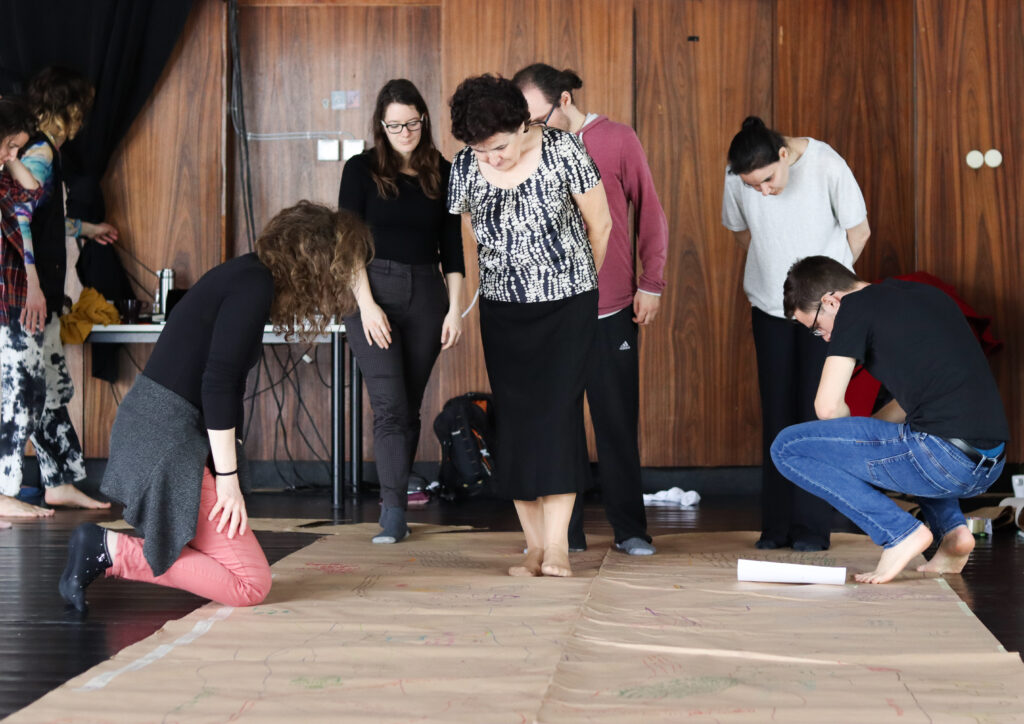
Ph: Danyi Viktoria
On the second day, we focused on gathering more theoretical knowledge about gender identity and the transgender community by watching a documentary movie and having an in-depth conversation, using the Genderbread Person, an illustrative educational resource
which gives a clear image of biological sex, gender identity, gender expression, and sexual orientation as separate spectrums.
At the end of the day, following the concept of the Living Library, we invited someone totalk about her lived experience as a Hungarian transgender woman based in Budapest (we agreed not to publish this person’s name due to safety reasons). This conversation was
probably the most powerful part of the weekend, thanks to our guest’s openness and the participants’ deep interest. I believe that progressing from general knowledge towards actual, living representation and personal reality is what made this weekend a truly unique experience.
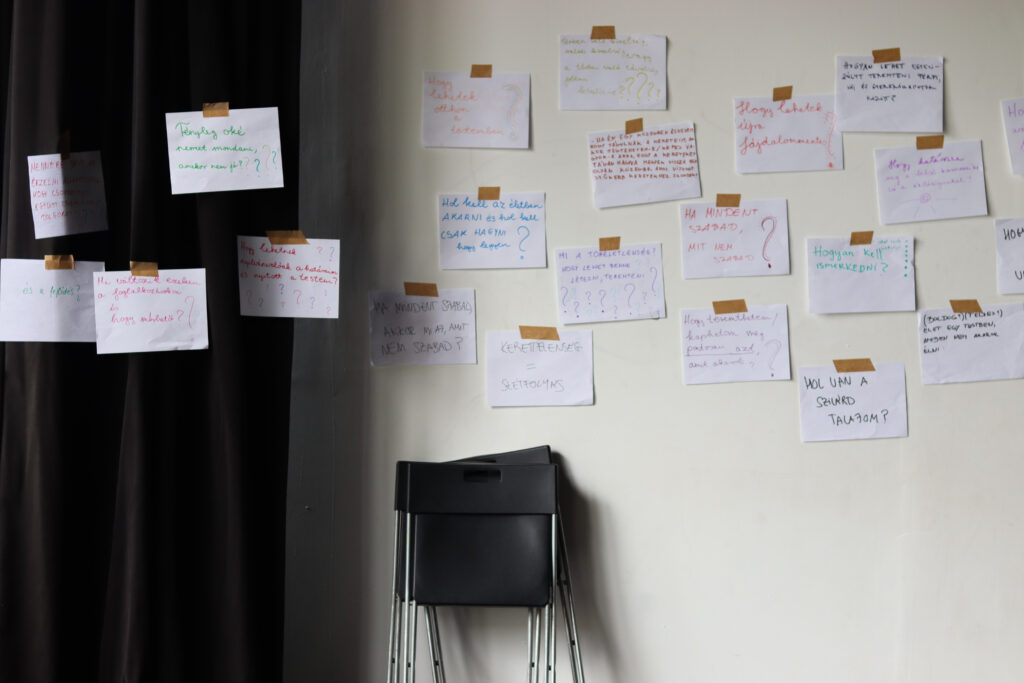
Ph: Danyi Viktoria
Finishing this article makes me emotional as writing it also allowed me to relive, understand, summarise, and let go of some of the extremely powerful experiences this series of events contained. I am so thankful to Luca Borsos, Ágnes Grélinger, Barbara Lévai, Luca Kövécs,
Anikó Rácz, the whole team of Sín Arts Centre and most importantly, all the participants for being the most prodigious partners, and I cannot wait for our ways to cross again.
Find out more about the Community of Budapest!
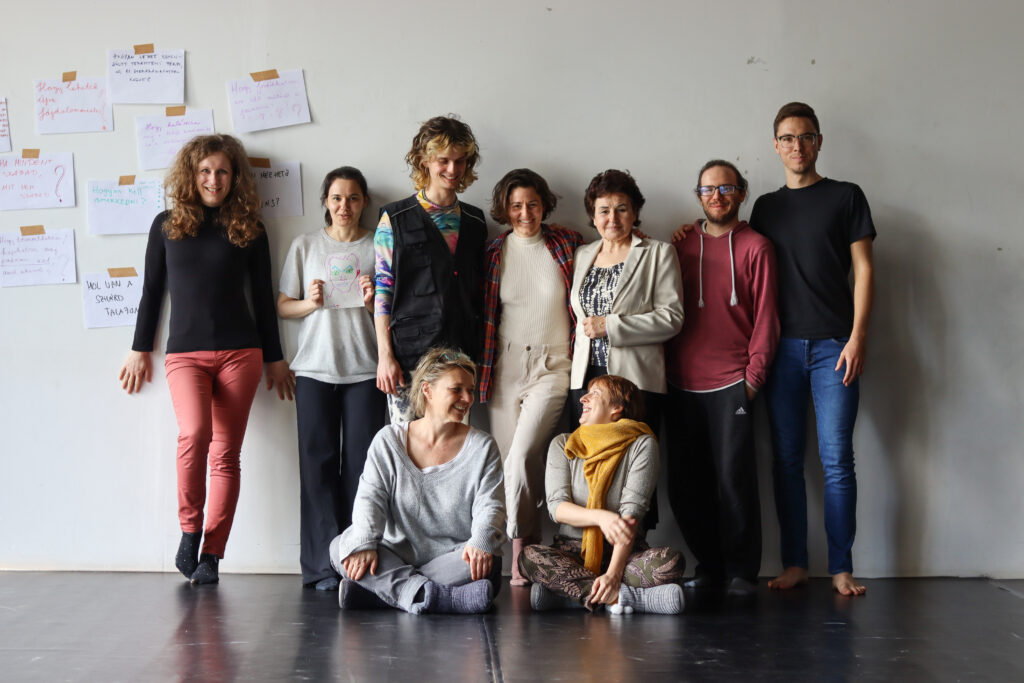
Ph: Danyi Viktoria

